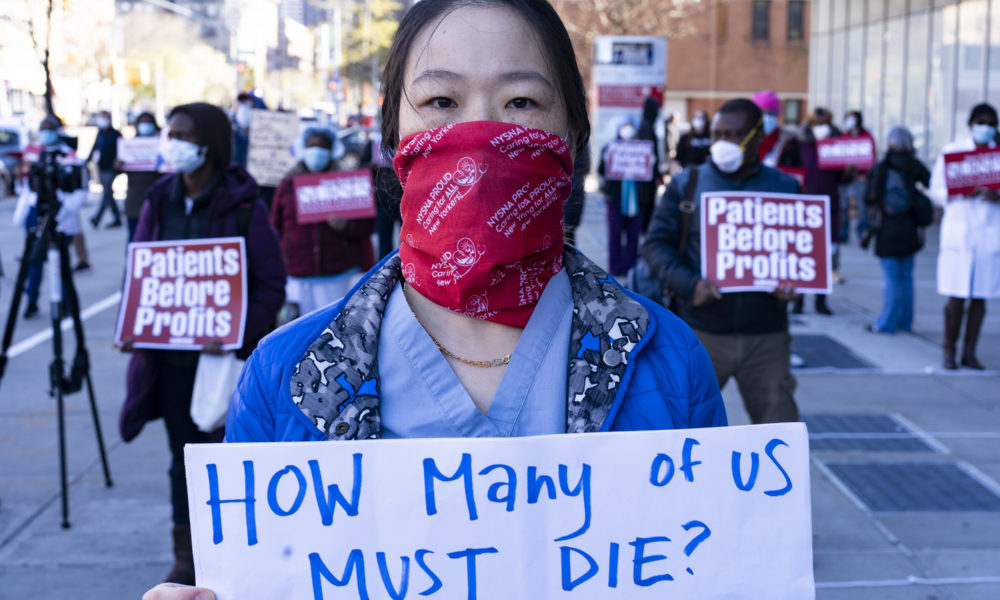Español | Français | Deutsch | Italiano | Português
One hundred days ago, on March 11, 2020, the World Health Organization (WHO) recognized that Covid-19 had become a global pandemic. Since then, the coronavirus — which had jumped from China and other Asian countries to Europe — has spread to every continent, leaving half a million people dead and several million infected. Today, 100 days after the pandemic’s start, the number of deaths in Europe has been surpassed by those in Latin America, where the curve of infections and deaths is only approaching its peak. In addition, the closures of factories, shops, and schools, as well as travel and entertainment restrictions, have an immediate impact on the lives of millions of working people and their families. In just three months, according to estimates, nearly 300 million jobs were lost, and 60 million people fell below the extreme poverty line, adding to the 700 million who were already surviving on less than $2 a day before the pandemic.
Meanwhile, during the pandemic, the capitalist states have strengthened their repressive powers, with increased surveillance and social control, and have also increased repression against the working class and oppressed sectors, particularly the Black community. The murder of George Floyd in Minneapolis comes against this backdrop of growing violence against Black people by police and white supremacist groups supported by Donald Trump, as well as the murder of Breonna Taylor, an EMT killed by police in May while sleeping in her Kentucky home. Racism, xenophobia, sexism, and Trump’s transphobia have already unleashed massive mobilizations that now defy “curfews” and face repression ordered by governors and mayors, both Republicans and Democrats. The cry of “Black Lives Matter!” and, during Pride Month, “Black Trans Lives Matter!” have ignited anger and solidarity that have spread like wildfire from Brazil to Germany, from Britain to Argentina. In France, at the call of Assa Traoré — sister of the young Adama, who was killed inside a police station in 2016 — thousands mobilized against racism and police crimes. In Brazil, women have denounced the killing of their children inside their homes, demanding justice for Miguel and João Pedro.
The racist hatred emanating from the Trump government is the most extreme example of the deep and structural segregation of the Black population in the United States. This is also evident in the pandemic, where victims are disproportionately Black and poor. In Chicago, where the Black population represents only one-third of the city total, they account for 73 percent of coronavirus deaths. In Milwaukee, Blacks make up 26 percent of the population but account for 81 percent of the dead. Likewise in the state of Michigan, where people of African descent make up 14 percent of the population but account for 40 percent of Covid deaths. This situation is not just a phenomenon in states governed by the Republican Party; it is the same where Democrats are in power.
It is people of African descent, along with the Latino and immigrant communities, who put their lives at risk in essential service work, in precarious jobs, without health protections. And they are a significant part of the 40 million workers who became unemployed overnight during this pandemic. If the antiracist rebellion against police violence in the United States has found an echo worldwide, it is because Black people, like the immigrant population, have become special victims of the coronavirus worldwide — with a risk of death closely linked to precariousness and conditions of overexploitation, aggravated by racism. Black women in Brazil — which has the largest Black population outside the countries of Africa — are paid up to 60 percent less than white men. They are the ones who lose their children to one of the world’s most murderous police forces. It is Black women who hold the worst, most precarious jobs, and who suffer the worst consequences of clandestine abortions.
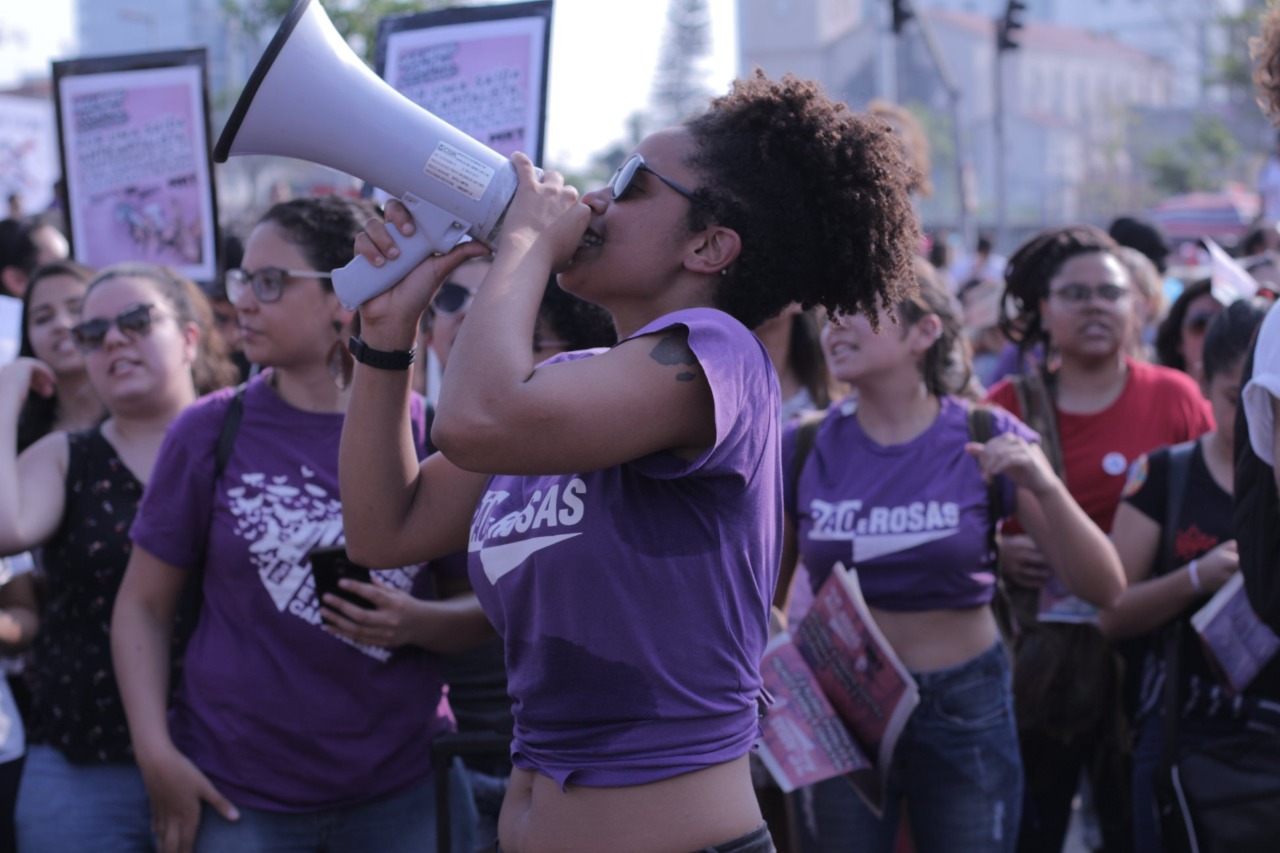
For women, there have been other specific consequences of the pandemic: the closure of schools, childcare, and recreation centers, as well as the conditions of quarantine itself, increases the burden of care-related tasks women take on at home. This has been even worse for women who are the sole support for their families, for those forced to continue working, for those who lost their jobs, and for women from the poorest sectors of society. In addition, an estimated 18 million women who had access to contraception may have lost that access during the pandemic, as contraceptives became scarce in many countries and impossible to acquire because of the restrictions. Meanwhile, budget cuts in healthcare systems before the pandemic limited their capacities, with many consequences. These include restricted access to safe abortion services: one estimate states that a reduction of only 10 percent in such access in the most impoverished countries will have produced 3 million clandestine abortions, leading to around 28,000 women dying and another 15 million having to endure unwanted pregnancies. Further, during government-imposed quarantines around the world, reports of gender-based violence increased by 30 percent.
Today, 100 days after the declaration of a global pandemic, health workers — more than 70 percent of whom are women — continue to struggle with overcrowding in intensive care units in some countries, and in other places they are already beginning to sound the alarm about the lack of resources to deal with the aftermath of anxiety, fear, and stress from pandemic-related job insecurity, loss of pay, and lack of resources for entire families. They are also denouncing governments for their lack of investment and preparation for possible further waves of the virus, and demanding greater resources for public health.
A few days before the WHO declared the global pandemic, millions of us had mobilized in the streets of hundreds of cities around the world, as we have done every March 8 in recent years, to commemorate International Women’s Day and to fight for our rights, against sexist violence and femicide, for the legalization of abortion, against the precarization of labor, and so on. Now the signers of this manifesto address ourselves to all those whom the capitalists put on the front lines of superexploitation and precarity, who work on the front lines of family social reproduction without pay, as well as those who work on the front lines of the different services and industries that are essential to guaranteeing the lives in society. We address ourselves to all those who are paid less than our male colleagues and do not have access to the same kinds of work but nevertheless are on the front lines producing more and more profits for a handful of capitalists; to those of us who occupy the front lines in the fight against misery and hunger, surviving at the expense of our own work under the worst conditions. Today, we address all those women, organized in unions and without the right to organize, Black women, immigrant women, racialized women, indigenous women, peasants, mothers of the tortured, imprisoned, disappeared, and murdered by the violence of the repressive apparatus of the state, women defenders of the land, young students, and lesbian and transgender activists.
We want to organize ourselves on the front lines of the economic, social, and political struggle against the bosses, against the governments and the parties that represent their interests, against the trade union bureaucracies that divide us and limit our strength. Again, as so often in history, we are willing to put ourselves on the front lines of the class struggle, to take heaven by storm.
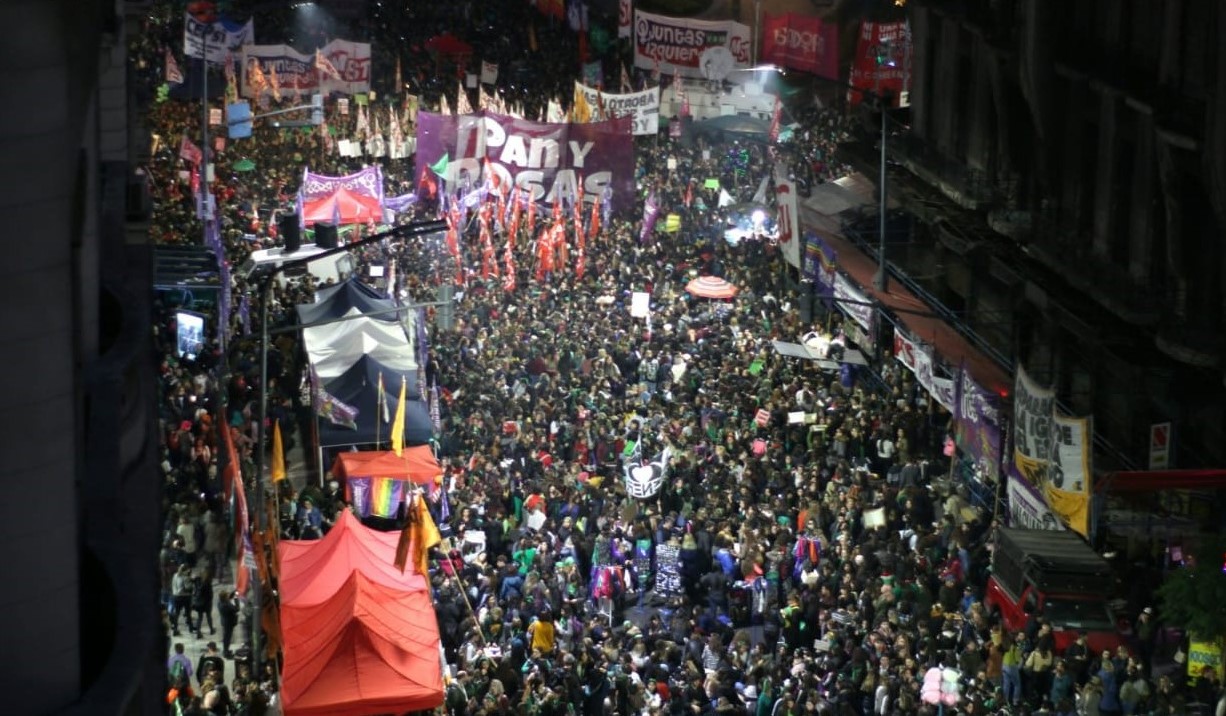
1. The coronavirus pandemic is not “natural.” It has deep roots and serious economic and social consequences.
The origin of this pandemic lies in the abrupt rupture of ecological balance caused by the unbridled advance of agribusiness. Its rapid spread, all over the planet, went hand in hand with the global value chains that, in recent decades, have tremendously expanded the frontiers of capital in its search for greater profitability. But the pandemic also broke out particularly brutally in countries whose healthcare systems have been depleted by decades of austerity plans, budget adjustments, and layoffs — at the same time that the pharmaceutical industry has focused its investments in research and development on “profitable” diseases, while governments underfunded or altogether ignored research programs on epidemics.
Nor can it be said that the tens of thousands of deaths caused by Covid-19 are the inevitable consequence of the spread of the virus. Governments were slow to respond to the warnings and slow to shut down nonessential activities because they wanted to give the greatest protection to capitalist profits. Then they imposed drastic global quarantines, without providing for mass testing or an expansion of hospital capacity in time. And then they rushed to send us back to work, without clear information or adequate prevention and hygiene measures, for the same reason. Most countries avoided taking over the private healthcare system and other fundamental measures so as not to negatively affect capitalist interests.
As we approach 500,000 deaths, we also declare that it is not “natural” that in some U.S. cities in which people of African descent make up 30 percent of the population, Black people make up 70 percent of coronavirus deaths. The same is true of the Latinx communities in the United States, and is repeated in the poor neighborhoods of all the large imperialist metropolises, where mostly immigrant families live. In the dependent countries, the situation is far worse. The infection and mortality rates of different sectors of the population show that confronting the pandemic when one has adequate housing, running water, a sewage system, a balanced diet, and access to prevention and hygiene products is not the same as doing so with none of that. The conclusion is that while anyone can contract coronavirus, the exposure of people to the disease and the distribution of resources to deal with it is deeply uneven, affecting the exploited classes and the oppressed especially hard. Those who are most exposed to contagion and death are precarious workers,, Black and indigenous people, peasants, immigrants, the poor in overcrowded and marginalized urban neighborhoods, and the homeless.
The virus has only accelerated, strengthened, and further exposed the brutal contradictions of the capitalist system, which is in its historic decline. While debates continue about how the coronavirus originated and about the true number of deaths resulting from the disastrous management of the pandemic, one thing is clear to millions worldwide: in capitalism, profit — profit for the few — comes before our lives.
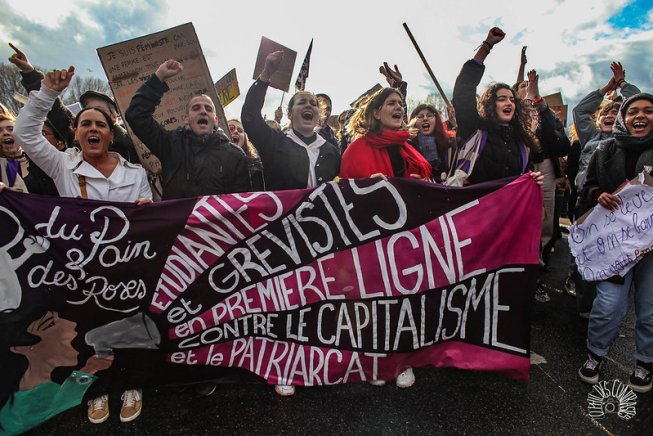
2. The coronavirus is not responsible for the capitalist crisis they want us to shoulder.
The capitalists and their governments are taking advantage of the coronavirus pandemic to increase layoffs, company closures, and furloughs with wage cuts, which will be followed by greater precariousness and worsening working conditions. The figures are as brutal and scandalous as the contagion the capitalists could not prevent: in the United States, nearly 40 million people have applied for unemployment, and there were historic drops in production in China and almost all of Europe. Throughout the world, bailouts have primarily benefited the big capitalists, with the imperialist countries giving some insufficient financial aid to the people, but only to avoid further economic paralysis and, above all, to prevent social uprisings. In the dependent countries, priority has been given to paying the foreign debt and rescuing businesses, with pitiable aid for the millions of working and poor families facing catastrophe.
But the coronavirus is not to blame for this crisis, which is rooted in the trends that developed after the previous economic crisis in 2008: low investment and productivity growth, high government and corporate debt, and stock market bubbles, which already heralded the possibility of a recession before the pandemic. The responses that governments are testing have only exacerbated the situation, especially since many sectors of the economy remain shut down, there will likely be new outbreaks of the virus, and a vaccine thus far remains elusive.
The capitalists will seek to save themselves with new attacks on the working class and poor masses even greater than those we saw during these first 100 days: they bring only misery and hunger to billions, wage cuts and worsening working conditions, more flexible working hours, and higher rates of unemployment. Therefore, we will have to fight for every demand — in terms of jobs and wages and working conditions, for quality universal health care, and against environmental destruction. Make the capitalists pay for the crisis!
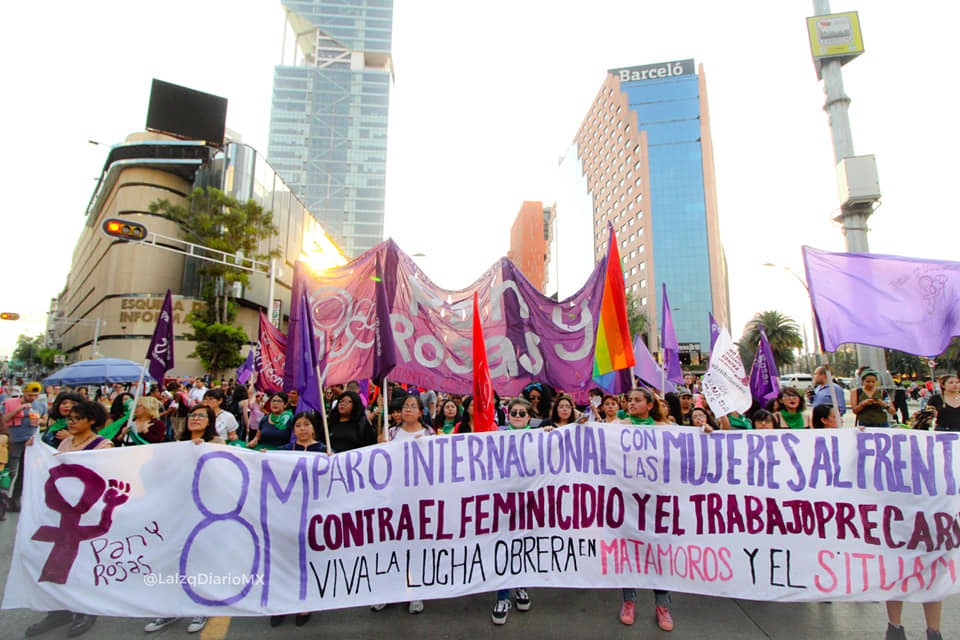
3. The capitalist system cannot function without women workers and without the benefits it gets from women’s unpaid labor.
During the long decades of neoliberalism around the globe, the working class was dislocated, fragmented, and attacked. The pandemic, though, has revealed that it is workers — both formal and informal — who truly make the world function and ensure the survival of millions. This is true of workers on the front lines of the healthcare system, as well as agricultural workers, sanitation workers, and textile workers; workers in logistics, transport workers on land, sea, rivers, and in the air; home delivery workers, telecommunications workers, workers in the energy industry, at water treatment plants, and so many others.
With our protests and strikes demanding the shutdown of factories and businesses in nonessential sectors during the pandemic, we also demonstrated capitalism’s enormous dependence on human labor. The fact is that despite great advances in robotics and artificial intelligence, it is workers who generate the profits that go into the capitalists’ pockets.
Meanwhile, life continues to be reproduced in the home, thanks primarily to the women who, for the most part, do the work involved in the social reproduction of the workforce without payment. All that unpaid work is on top of what we already have to do at our paid jobs, where we represent a majority or at least a very large component of the front lines, as healthcare personnel, eldercare and childcare workers, in cleaning, in the production and sale of food and other basic goods, and in paid domestic work in the homes of the wealthy. And we go beyond that — because women now represent 40 percent of salaried workers in general, worldwide, for the first time in history!
In short, the pandemic has shown that both the economy and the reproductive work that sustains the capitalist system and the lives of millions every day depend on the work of the class that makes up the majority of society. Not only has it been demonstrated that our work is essential for social reproduction — something clear as a bell to all — but also that we occupy strategic positions for the reproduction of capital. And by occupying these “vulnerable points” in supply chains globally, we and our coworkers collectively constitute a social force that can have an impact on the functioning of capitalism.
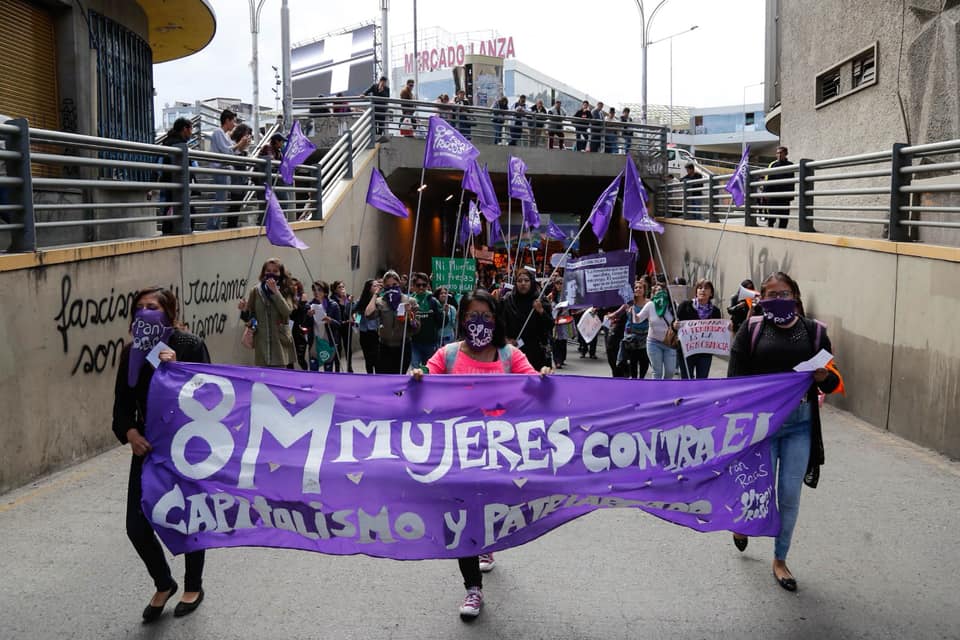
4. Let’s organize and expand our front line in the working-class struggle!
Working and poor women — as so often in history — are also on the front lines of the struggle against those who want to take away our bread and our future. That is why the scribes of the bourgeoisie are already warning their leaders and bosses about the potential for insurrections and revolutions that could occur when the pandemic is over and the austerity plans and cuts being made by capitalist governments unload the crisis onto our shoulders with even greater brutality.
The Italian nurses were among the first to call all workers out for a general strike in March, which they could not do themselves because of their lifesaving work. Today, in Spain, healthcare workers are demanding a return of the portion of their salaries that was stolen with the austerity measures that followed the 2008 economic crisis, and demanding the defense of public health care. In the United States, healthcare workers have had to face police repression and arrests as they’ve joined the “Justice for George Floyd!” mobilizations as street medics. In all countries, the anger of healthcare workers, as well as teachers, caregivers, and social workers, continues to mount against the governments responsible for disaster and for helping the rich, whose incomes and property are the first things to be “rescued.”
Thousands of workers at fast-food companies, in supermarkets, and in warehouses, sweatshops, and nonessential factories have, along with their colleagues, rebelled against the criminal bosses in Italy, France, and particularly in the heart of U.S. imperialism, as well as in several Latin American countries. In many places, these protests — some of them genuine revolts against hunger, food shortages, and famine — have been led by poor families. They are a preview of what could happen if millions of workers return to their jobs in unsafe conditions, if new and worse hiring conditions, lower wages, and longer working hours are imposed on them, or if more families remain on the streets.
The union bureaucracies have, however, closed ranks with the bosses and governments, quarantining our demands and our plans to fight to defend our rights. Where there have been struggles, they try to keep them isolated and limit them to sectoral demands. In contrast, we call for a workers’ united front. We demand that the leaders of all existing working-class organizations make agreements that allow us to strike together, even if we march separately. But our larger goal is to drive them out and take back the unions for our class.
That is why we want organize and expand that front line of fighters, against the bureaucracies that divide us and seek only reconciliation with governments and the capitalist states, because we must triumph in today’s struggles and prepare to win in those to come, which will surely multiply.
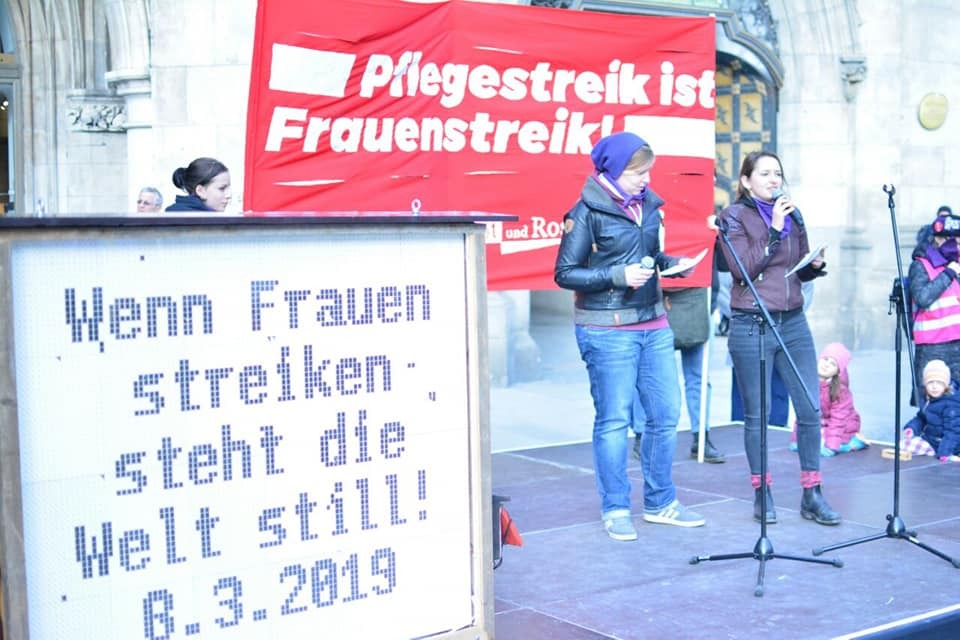
5. For political independence from the parties that represent the interests of the capitalists.
We know that the working class, increasingly feminized and racialized, can disrupt the functioning of the economy and impair capitalist profits, establish alliances with other poor and oppressed people, and build a new social order based on meeting the needs of the great majority of people and not on the profit motives of a parasitic class. But when that potential is put into action, when we confront the bosses, we confront not only the agents of the bosses within the labor movement — the union bureaucrats who are always ready to negotiate the rate of exploitation, but never rip it out at the roots — but also the states and the political parties that represent the capitalists’ interests.
These politicians go beyond Donald Trump, Giuseppe Conte, Boris Johnson, Jair Bolsonaro, Sebastian Piñera, and Emmanuel Macron. There are also women such as Angela Merkel, who with a motherly smile and imperialist firmness is proposing a program for rebuilding Europe that will salvage states and big businesses with bailouts that the working class will have to pay for; the terms of this are being worked out behind our backs. There’s Jeanine Áñez in Bolivia, who now calls for prayer and fasting to confront the pandemic, and who did not hesitate to order military massacres to consummate last November’s coup d’état. There are other extreme right-wing forces that were already growing before the pandemic, deploying their reactionary crusades against the women’s movement, LGBTQ+ people, and immigrants. Together with the Vatican and fundamentalist evangelical churches, they attack feminism and what they call “gender ideology,” combining the conservative aim of subordinating women to traditional family roles with their hatred of foreigners. Now, in the face of the crisis, they are once again trying to capitalize — in a reactionary way — on the social discontent with governments.
In response to the growth of these extreme right-wing forces, the reformist Left in Europe, the United States, and Latin America all push the idea that we should resign ourselves to the “lesser evil,” be it the old social-liberal parties in Europe, the Democratic Party in the United States, or “progressives” in Latin America. But “lesser-evilism” has always meant accepting the same neoliberal policies combined with just a few very limited social measures that are purely cosmetic given the magnitude of the current crisis. In order to fight the extreme Right, “lesser-evil” governments do not represent an alternative; they leave capitalist profits intact and continue to rely on the most reactionary institutions of their states, such as the police, the courts, and the church hierarchies. The capitalist regimes don’t dare put the brakes on their messages of hate; only the feminist mobilizations and today’s antiracist mobilizations have taken that up.
That is why we must also find a way around the old and new reformists who, using the language of the Left, administer or offer to administer capitalism in decline. They are the ones who today haggle with their countries’ big capitalists over crumbs, with the illusion that after the pandemic everything will return to how it was before: tremendous profit for the capitalists and more precarious wages for working families. That is the scandalous role Unidad Podemos is playing in the imperialist Spanish State, governing together with the neoliberal PSOE, paying tribute to the parasitic Bourbon monarchy, and sticking to the 1978 constitution inherited from Franco.
These parties, such as the Frente de Todos (Front for All) in Argentina, speak of “inclusion” while the government continues to pay the fraudulent foreign debt and young women in the slums around the nation’s capital die after two weeks of complaining that they have no access to clean water in the middle of a pandemic. Likewise in Mexico, the government of Andrés Manuel López Obrador (AMLO) — which came to power on the hopes of change from millions of people, including broad sectors of women who trusted his promise to govern “for rich and poor people alike” — now favors policies that benefit big business. Meanwhile, militarization continues in Mexico — with femicide increasing for 12 years — as part of AMLO’s subordination to imperialism and Trump’s demands. And in Bolivia, Evo Morales’s MAS has engaged in systematic negotiations with the coup leaders who now control the state, using as a bargaining chip the blood spilled during the brave and spontaneous popular resistance to the coup, in which the brave “pollera women”1A pollera is a traditional dress worn by indigenous women in Bolivia. —trans. played a leading role.
They are the same ones who, like Bernie Sanders, play the sad and tragic role of trying to rehabilitate a bloodthirsty political formation like the U.S. Democratic Party, promising some minor social reforms with fiery speeches, only to end up withdrawing from the campaign and endorsing Joe Biden, an establishment politician who, no matter how hard they try, they cannot dress up as a progressive insurgent. In the face of the crisis of the Trump administration and the emergence of antiracist protests, the Democratic Party has been called on once again to play its historic role of pacifying social movements and assimilating them into the imperialist bourgeois regime. It remains to be seen if the Democrats will succeed with a candidate who spoke at a memorial for George Floyd but then said that police should be trained to shoot people “in the leg instead of the heart” as a way to avoid killing civilians. Biden also stands accused of sexual harassment and other markedly misogynistic behavior.
And they all play the same calamitous role we saw in Greece from Syriza, which came to power as the “hope of the Left” and ended up applying the brutal austerity plans imposed by the European troika in the context of the last great crisis that began in 2008.
While the representatives of the conservative parties, the Right, and extreme right-wing populism vie for the top spot in the tournament of misogynists, xenophobes, racists, homophobes, and transphobes, the old and new reformists employ a “politically correct” discourse but they largely lack concrete policies to substantially change the lives of millions of women, lesbians, and transgender people, immigrants, racialized people, and precarious workers. In many countries, with a few minor measures and quite a lot of talk, they have assimilated and co-opted a good part of the feminist and women’s movement. While millions of women workers and young students have embraced the anti-patriarchal struggle in recent years, some of the most recognized activists have been integrated into government institutions or have become spokespersons, candidates, or campaigners for reformist parties.
In opposition to this, we fight for the complete independence of the women’s movement from all political representatives of the regimes who, in different ways, represent the interests of different capitalist sectors — but do not represent our interests, those of working people. And we fight for a working-class solution to this enormous crisis. Not in our name!
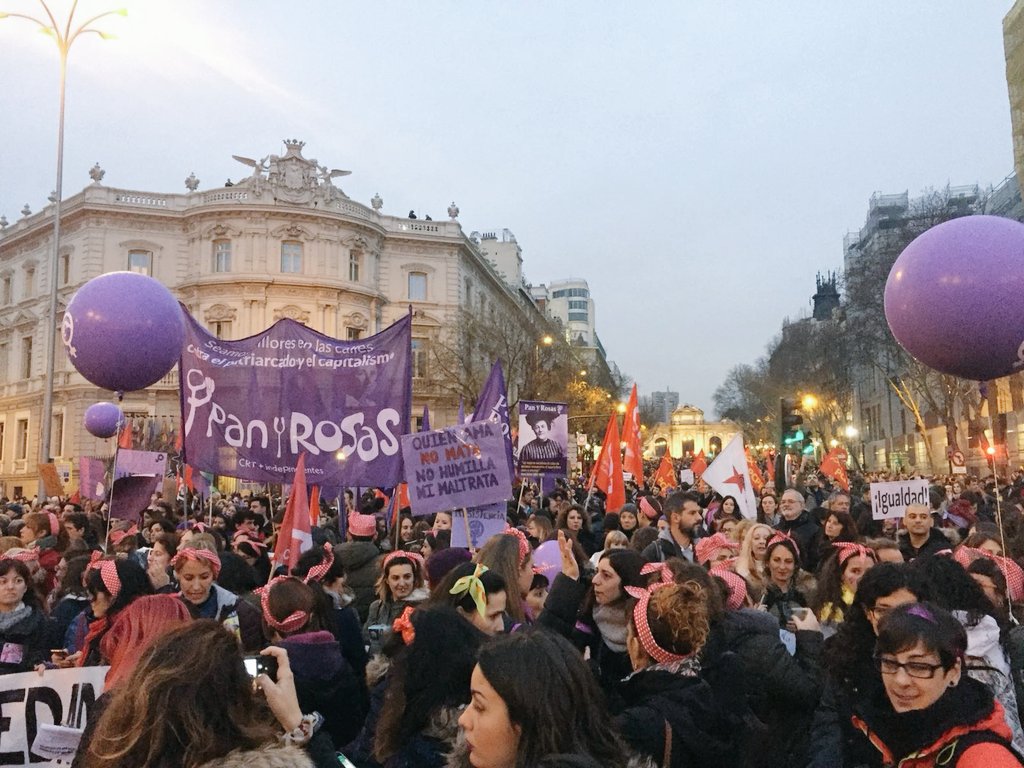
6. Our lives are worth more than their profits!
The capitalists, the governments and political parties that represent their interests, and the trade union bureaucracy as their agents in the labor movement, have a program of measures to make us pay for the crisis. We raise an opposing program that challenges the interests of the capitalists so that working people will not have to pay for the crisis again.
All over the world, to deal with the pandemic and provide quality health care, we continue to demand the centralization and nationalization of healthcare systems — including private health care, with investments and appropriate wages — under workers’ control.
The pandemic is no excuse for closing or cutting back on sexual and reproductive health programs, public services for safe abortions, or any other service for women and LGBTQ+ people. Nor is it an excuse for continuing to condemn pregnant women to serious health consequences or death from unsafe, clandestine abortions in countries where that right has not yet been established. That is why we continue to fight for the right to legal, safe, and free abortion, as demanded by the women’s movement in Argentina, Mexico, Chile, and other countries.
We call for organizing those who must continue to work and we demand that they have control over safety and hygiene conditions. At the same time, we fight against layoffs and against furloughs with wage cuts — in fact, we demand that layoffs be prohibited. We pay special attention to precarious workers, those lacking labor rights, and we demand subsidies and quarantine wages so they will have an income that allows them to meet their basic needs.
We fight for equal pay for equal work. Racism and sexism are mechanisms of domination that reinforce overexploitation, which is why we fight to eliminate the wage gap between men and women, and why we fight against racial, ethnic, and xenophobic discrimination.
We confront racism with the cry “Black Lives Matter!” We demand justice for Marielle Franco. We defend the rights of immigrant women who, in the face of indiscriminate border closures, have been forced into overcrowded camps for temporary agricultural workers, with inhumane conditions, without health care and other essential services. We defend the rights of women who have been forced to quarantine in their employers’ homes, suddenly separated from their families and living like inmates. We demand the closure of all immigration detention centers.
Against the demagogy of the Right, we fight for working-class organizations to demand state subsidies, debt forgiveness, and cheap credit for small businesses, self-employed people, and freelancers who have lost income during periods of quarantine.
We fight for progressive taxes on large fortunes, because it is obscene that the richest 1 percent of the planet holds 82 percent of global wealth. Tax-exempt church properties, as well as the huge number of empty properties owned by large real estate groups that speculate on rents and tourism, must be put at the service of the needs of working people, beginning with the homeless, families living in overcrowded and unhealthy conditions in slums and temporary structures, and women and children who are victims of male violence and abuse.
In the dependent countries, we call for the cancellation of foreign debts, because we cannot allow banks and financial capital to continue to sink entire countries and regions, nor saddle states with debts they cannot pay. That is why we also call for the nationalization of banks under the workers’ control in order to centralize national savings according to the needs of the people.
A state monopoly on foreign trade is necessary in all countries. In countries that export raw materials, this would prevent a handful of multinational corporations in agribusiness, mining, and fishing from seizing all the revenues.
We reject the strengthening of state repressive apparatuses — security forces, armed forces, and the police. They murdered George Floyd, just as every day they kill young people of African descent and the children of poor families around the world. They are repressing our protests. They are responsible for torture, extortion, drug trafficking, and trafficking women. They enforce the quarantines. We also reject police and state spying and control with the supposed objective of stopping the spread of the virus. We stand for broad self-organization so we can use the self-control and self-discipline of the working class to confront the pandemic.
In the imperialist countries, we fight reactionary patriotism, racism, and all forms of discrimination against immigrants. It is essential to raise the banner of anti-imperialism in these countries, whose monopoly companies and governments brutally plunder the oppressed nations of the world. We demand an end to sanctions against Venezuela, Cuba, and Iran.
As women have mobilized every March 8 around the world in massive numbers for our rights, we have called for working-class internationalism, for uniting across borders against our common class enemies. With our voices burning with anger, we call on women workers around the world to organize and fight for this program. Our lives are worth more than their profits!
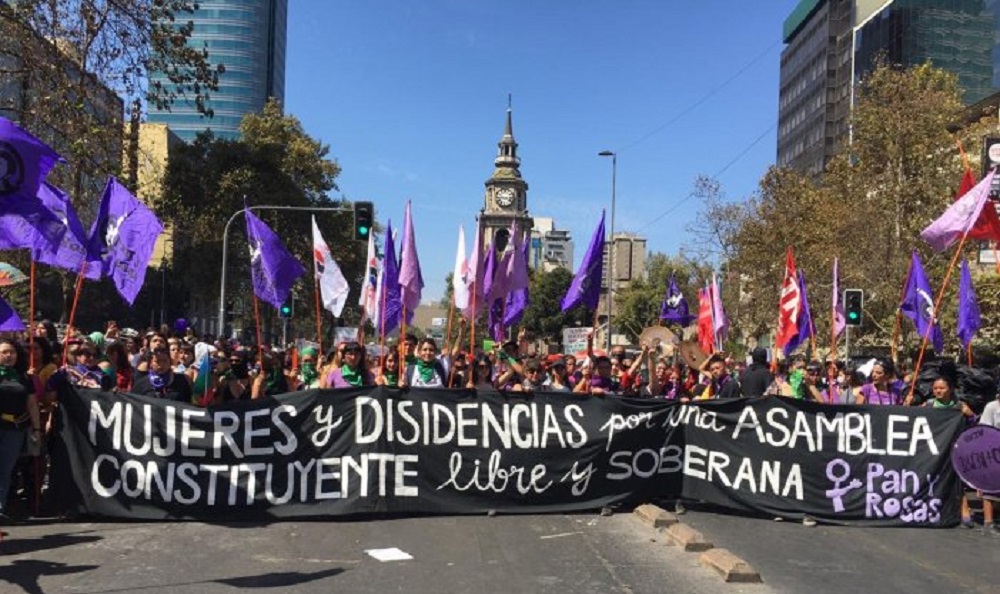
7. For bread and roses!
Working-class women have never passively accepted attacks on our living conditions, nor have we stood by and watched our families starve. We did not remain silent when our rights and freedoms were violated, nor have we hesitated when we have set out to achieve what we think is right. That is the story of the poor women of France in 1789, the Black women at the forefront of the revolution that abolished slavery in Haiti in 1804, and the Russian textile workers who in 1917 kicked off the revolutionary process that brought the working class to power. There are many other examples throughout history of women providing the spark that launched a revolution.
In the same way, working-class women will confront the attacks that are now being prepared amidst the pandemic crisis — a crisis that will allow new ways of thinking to emerge. Will our current and coming struggles for bread set the prairie ablaze? Our goal is to break the backs of the capitalists once and for all, so we can stop always having to fight back and instead achieve victory. As the great revolutionary Rosa Luxemburg said, we “take a stand for the establishment a new society,” not “for surface modifications of the old society” that has enslaved us.
We are fighting for a society in which reproduction and production develop in harmony with nature — a society freed from all the forms of exploitation and oppression that are now forced on the vast majority of people. But we are aware that such a society will not emerge spontaneously from the current crisis, even if rebuilding the capitalist system becomes increasingly difficult and any recovery will be more short-lived than the previous one. We know that although the contradictions of capitalism are increasingly unresolvable under its normal rules of operation, capitalism’s decline will not automatically lead to the dawn of a triumphant global insurrection. It is necessary to prepare that, beginning now.
Women workers, anti-capitalist feminists, and revolutionary socialists are counting on women being on the front lines of the political and class struggle to defeat the capitalists, their governments, and their states. We are aware that as we struggle for a program that offers an independent workers’ solution to the crisis that is afflicting humanity right now, we must also prepare for future struggles. We are aware that we need to establish a revolutionary working-class political organization or we will be powerless in the next battles of the class struggle which the capitalists — who have declared a real war against us, made more intense by the pandemic — are preparing.
Let’s get to work! Let’s build an international revolutionary political organization of the working class that creates a real perspective for defeating capitalism and establishing a new socialist order — one in which bread and roses abound.
June 19, 2020
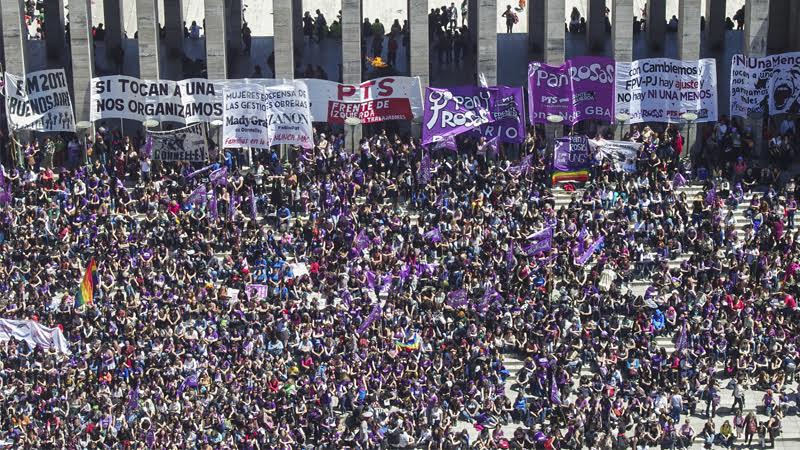
Signers
ARGENTINA: Myriam Bregman, lawyer, member of the Workers Left Front (FIT), Buenos Aires; Andrea Lopez, general practitioner at the Hospital José Ingenieros, member of the Board of Directors of the healthcare workers’ union CICOP, La Plata; Natalia Aguilera, nurse at the Hospital San Martín, La Plata; Pamela Galina, resident at the Hospital Noel Sbarra, CICOP delegate, La Plata; Natalia Paez, resident at the Hospital San Martin, CICOP delegate, La Plata; Lucía Rotelle, psychologist at the Hospital José Ingenieros, delegate of the public sector workers’ union ATE, La Plata; Laura Cano, resident at the Hospital José Ingenieros, CICOP delegate, La Plata; Julieta Katcoff, nurse at the Hospital Castro Rendón, ATE delegate, Neuquén; Florencia Peralta, nurse at the Hospital Castro Rendon, ATE delegate, Neuquén; Barbara Acevedo, nurse at the Hospital Garrahan, Buenos Aires; Carina Manrique, nurse at the Garrahan Hospital, Buenos Aires; Florencia Vargas, administrative assistant at the Garrahan Hospital, Buenos Aires; Florencia Claramonte, administrative assistant at the Garrahan Hospital, Buenos Aires; Laura Magnaghi, medical technician, member of the board of directors of ATE Sur, Alende Hospital, Lomas de Zamora; Claudia Ferreyra, nurse at the Hospital Rivadavia, Buenos Aires; Melina Michniuk, psychologist at the Hospital Piñero, Buenos Aires; Andrea D’Atri, founder of the women’s group “Pan y Rosas,” Buenos Aires.
BOLIVIA: Fabiola Quispe, lawyer and member of PRODHCRE (Professionals for Human Rights and Against State Repression), La Paz; Gabriela Ruesgas, economist and professor of sociology at the Higher University of San Andrés (UMSA), La Paz; Daniela Castro, PhD student in anthropology at the UMSA, La Paz; Gabriela Alfred, bachelor of philosophy, researcher, Tarija; Violeta Tamayo, political scientist and researcher, La Paz.
BRAZIL: Letícia Parks, member of the Black revolutionary group “Quilombo Vermelho”; Fernanda Peluci, leader of the São Paulo subway workers union; Carolina Cacau, teacher of the Rio de Janeiro State Network; Silvana Araújo, front line strike activist for outsourced workers at the University of São Paulo; Diana Assunção, leader of the non-academic workers’ union at the University of São Paulo; Maíra Machado, leader of Apeoesp (São Paulo State Teachers’ Union); Flávia Telles, coordinator of the Academic Center of Human Sciences of the State University of Campinas; Flavia Valle, teacher of the State Network of Minas Gerais; Val Muller, student at the UFRGS and activist of the youth group “Juventude Faísca,” Rio Grande do Sul; Virgínia Guitzel, trans activist and student at the UFABC, São Paulo.
CHILE: Natalia Sánchez, doctor of the Emergency and Protection Committee, Antofagasta; Silvana González, worker at the Antofagasta Hospital and leader of the trade union N°1 Siglo XXI, Antofagasta; Carolina Toledo, nurse and member of the Health Brigades in the revolt of October 18, 2019, Santiago; Carolina Rodriguez, Paramedic Technician at the Sotero del Río Hospital, Santiago; Isabel Cobo, industrial worker and laboratory union leader, Santiago; Joseffe Cáceres, cleaning worker and union leader of the Pedagogical University, Santiago; María Isabel Martínez, leader of the local teachers’ association in Lo Espejo, Santiago; Patricia Romo, president of the local teachers’ association, Antofagasta; Pamela Contreras Mendoza, education assistant and former spokesperson of the March 8 Coordinating Committee, Valparaiso; Nataly Flores, retail worker, the leader of the Easy union, Antofagasta; Camila Delgado, retail union leader, Temuco.
COSTA RICA: Stephanie Macluf Vargas, student at the University of Costa Rica; Fernanda Quirós, president of the Philosophy Students Association at the University of Costa Rica; Paola Zeledón, call center worker, host of the program “Perspectiva de Izquierda” at La Izquierda Diario CR.
FRANCE: Laura Varlet, railway worker at the SNCF in Seine-Saint Denis, Paris region; Nadia Belhoum, trash collector at the RATP (Paris urban transport company); Marion Dujardin, arts teacher in the Paris region; Elise Lecoq, history teacher in the Paris region; Diane Perrey, teacher, Toulouse.
GERMANY: Charlotte Ruga, midwife at the München Klinik, Munich; Lisa Sternberg, ICU nurse at the München Klinik, Munich; Lilly Schön, economist and employee at the University of Applied Sciences for Engineering and Economics (HTW), Berlin; Tabea Winter, student of Social Work, Alice Salomon University of Applied Sciences, Berlin.
ITALY: Scilla Di Pietro, restaurant worker; Ilaria Canale, nursing student.
MEXICO: Sandra Romero, paramedic in the front line of the fight against Covid-19; Úrsula Leduc, laboratory worker at the Mexican Social Security Institute (IMSS) and the Secretariat of Health; Lucy González, precarious worker in the healthcare sector; Sulem Estrada Saldaña, grade school teacher; Flora Aco González, reinstated public sector worker and defender of labor rights; Yara Villaseñor, precarious service worker; Alejandra Sepúlveda, reinstated public sector worker and defender of labor rights; Miriam Hernández, administrative worker, non-academic workers’ union of the National Autonomous University of Mexico (UNAM); Claudia Martínez, medical intern.
PERU: Zelma Guarino, agronomy student; Cecilia Quiroz, leader of the women’s group “Pan y Rosas”; Melisa Ascuña, teacher; Fiorela Luyo, university student.
SPANISH STATE: Josefina L. Martínez, journalist and historian, Madrid; Cynthia Burgueño, historian and education worker, Barcelona; Raquel Sanz, domestic worker, Madrid; Àngels Vilaseca, social services worker, Barcelona; Soledad Pino, communications worker, Madrid; Rita Benegas, immigrant domestic worker, Barcelona; Neris Medina, immigrant worker in a fast food chain, Madrid; Lucía Nistal, researcher at the Autonomous University of Madrid (UAM), Madrid; Verónica Landa, journalist at Esquerra Diari, Barcelona.
UNITED STATES: Tre Kwon, nurse, New York City; Julia Wallace, Black Lives Matter activist, member of Local 721 of the Southern California Public Service Workers Union, Los Angeles; Tatiana Cozzarelli, PhD student in Urban Education at CUNY, New York City; Jimena Vergara, Mexican immigrant, correspondent for Left Voice, New York City.
VENEZUELA: Suhey Ochoa, student at the Central University of Venezuela (UCV).
And all the workers, students, housewives, and activists that make up Brot und Rosen, Germany; Pan y Rosas, Argentina; Pan y Rosas, Bolivia; Pão e Rosas, Brazil; Pan y Rosas “Teresa Flores,” Chile; Pan y Rosas, Costa Rica; Pan y Rosas, Spanish State; Bread & Roses, United States; Du pain et des roses, France; Il pane e le rose, Italy; Pan y Rosas, Mexico; Pan y Rosas, Peru; Pan y Rosas, Uruguay; Pan y Rosas, Venezuela.
Notes
| ↑1 | A pollera is a traditional dress worn by indigenous women in Bolivia. —trans. |
|---|


